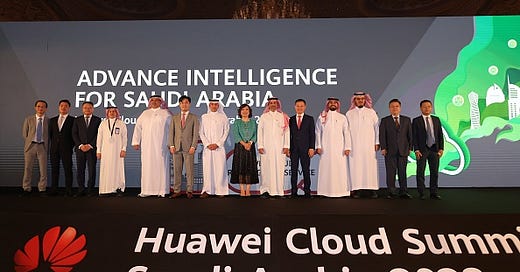Full report from US-CESC, joint statement from PRC-KSA-IRI meeting, AI report from Middle East Institute, CIPE in Abu Dhabi, ground breaks on Saudi-China refinery in Fujian, China in Cairo film fest
Competition and Conflict: China and the Middle East - US-China Economic and Security Commission. So yesterday I posted the executive summary document, not realizing that there’s a 70-page China-MENA chapter. And my work is cited a lot in there, which is very cool! The anglo in me is trying to find some way to express ironic detachment, but I’ve been making a conscious effort to fight those instincts, and have to admit if feels good to see my stuff getting cited. Ahem. Enough of that. The abstract:
The Middle East is a region of strategic importance to China due to its energy resources, location astride key trade routes, and possible receptivity to Chinese efforts to construct an alternative, illiberal world order. As China has deepened its trade and investment interests in the Middle East over the past decade, it has also built a variety of diplomatic partnerships and sought to present itself as a neutral arbiter of regional disputes while expanding its military activity in the region. Chinese engagement with the Middle East is selective and transactional, focused on advancing its own interests; Beijing appears to have little desire to play a significant role in advancing regional security or to meaningfully contribute to a resolution of ongoing disputes, including the recent Israel-Hamas war. Instead, China appears content for the moment to free-ride on the U.S. and allied regional security infrastructure—including, most recently, the defense of maritime shipping from Houthi attacks— while blaming the United States for promoting instability. China also works to undermine U.S. ties with key Middle Eastern partners while supporting adversarial countries like Iran. Chinese strategists likely also assess that the turmoil in the Middle East deflects a portion of U.S. attention and resources away from the Indo-Pacific. In the short run, China benefits from its relationships in the Middle East focused on energy trade and securing infrastructure contracts for its state-owned enterprises. In the long term, Beijing aims to expand market share for renewable energy and high-value exports, gain supporters in its bid for global leadership, and potentially establish new outposts capable of supporting its military for increased power projection. China’s involvement in the Middle East thus presents U.S. policymakers with an array of economic, normative, and geopolitical challenges.



